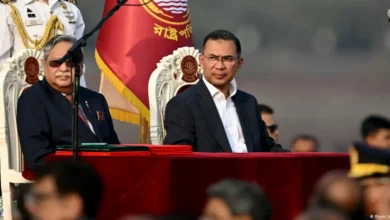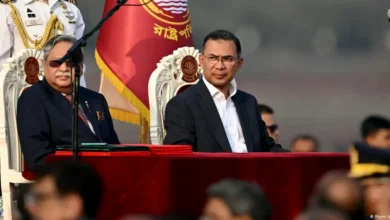Empowering youth to lead tomorrow’s world

By Reaven D’Souza
Executive Managing Editor
Nearly half of the people on our planet today are 30 or younger, and the 1.2 billion people who are in the age group of 15 to 24 years — defined by the United Nations as ‘youth’ — represent 16 percent of the global population. By 2030, which is the target date for realizing the Sustainable Development Goals (SDGs) that make up the UN 2030 Agenda, the number of youth worldwide is projected to increase to nearly 1.3 billion.
Youth represents a dynamic cohort of a national population, serving as a positive force and an enabler of change and development, Although criticized for their immaturity and lack of responsibility, and often perceived as contributing to many of the existing social problems, youth are in reality a crucial asset that helps usher in economic, social and political transformation and progress in nations.
Countries with a large youth demographic have the potential to realize what economists refer to as a ‘demographic dividend’, which is marked by accelerated rate of per capita economic growth. However, the economic dividend is not a certainty, and could easily become a future liability, unless policymakers make the necessary investment in the education, health and well-being of young people.
It is also important to ensure that youth are provided with meaningful employment and leadership opportunities, as well as endowed with the knowledge and skill-sets that empower them to thrive in a world of rapid technological advances. Healthy, educated and fully engaged young people are more resilient in the face of individual and social challenges, and can be crucial assets in overcoming intergenerational poverty and bringing about economic prosperity to countries.
Although importance of the youth cohort to the social and economic development of countries is quite clear, too many young people in too many places around the world still grapple with poverty, inequality, discrimination, and rights violations that prevent them from acquiring the skills needed to achieve their full potential and realize their aspirations.
However, despite the hurdles to their progress and prosperity, youth around the world are overwhelmingly optimistic about the future. A recent survey showed that 67 percent of young people believe in a better future, with 15 to 17 year-olds being the most optimistic about this. The majority of survey respondents (69%) across all age groups also agreed that providing younger people with more say in policy development and change would make political systems better.
Globally, only 2.8 percent of parliamentarians are under 30 years old. In Kuwait, although the minimum age to vote is 18, the eligibility to be a candidate for parliamentary election is set at 30 years of age. Despite youth within the 18 to 29 age group representing more than 17 percent of citizens in Kuwait, their exclusion from direct participation in parliamentary life is not only unfair but also leads to important policy ramifications.
Considering that younger generations will have to live the longest with the consequences of legislation discussed and approved by legislators today, it is imperative their voices be heard in the National Assembly. Laws enacted in their absence are not likely to reflect the social, economic and political priorities and perspectives of youth, or ensure that due attention is paid to youth issues such as education, unemployment, gender equality, and to potential future repercussions of climate change.
Kuwaiti youth have a better chance for their voices to be heard at the United Nations than in their own parliament. The annual ECOSOC Youth Forum organized by the UN Economic and Social Council (ECOSOC), provides an important platform where young people can contribute their ideas, solutions, and innovations to guide policy discussions at the United Nations. The forum also allows youth from around the world to collaborate and explore ways to promote their development agendas.
The 2024 ECOSOC Youth Forum, which was held at the UN Headquarters in New York on 16–18 April, provided young people with the opportunity to discuss and collaborate on innovative ideas and issues relevant to youth and society. It also enabled them to convey their recommendations to the intergovernmental consultations on the UN ‘Summit of the Future’, which is scheduled to take place at the UN on 22 and 23 September.
The ‘Summit of the Future’, is expected to provide a rare opportunity for global leaders to mend eroded trust and demonstrate that international cooperation is possible to effectively achieve agreed goals and tackle emerging threats and opportunities. The Summit will also hopefully forge a new international consensus on how we deliver a better present, while safeguarding the needs and interests of youth and future generations.
Every year on 12 August the world observes International Youth Day (IYD) to celebrate the power and potential of global youth, as well as raise awareness on issues related to youth, and recognize their efforts in supporting Sustainable Development Goals (SDGs) in communities. This year’s theme for IYD, ‘From Clicks to Progress: Youth Digital Pathways for Sustainable Development’, underlines the crucial role of youth in driving digitalization and accelerating progress of SDGs.
According to the UN, with three-quarters of those aged 15 to 24 using the internet in 2022, they form the largest demographic of users and developers shaping digital trends globally. Despite persisting digital-divide challenges, young people are often considered ‘digital natives’, and are at the forefront of adopting and innovating with new technologies to drive change and create solutions to address global challenges.
In Kuwait, ahead of this year’s IYD, Minister of Social Affairs, Family and Childhood Affairs and Minister of State for Youth Affairs Dr. Amathal Al-Huwailah, said that in line with the directives of Kuwait’s top leadership, the state attaches significant importance to preparing and empowering youth for leadership roles, as well as supporting their innovative ideas and technological endeavors.
The minister stressed that the Youth Public Authority (YPA), which spearheads support for Kuwaiti youth, regularly implements activities aimed at enhancing the skills and experiences of youth. She affirmed that YPA, in partnership with Boeing Corporation and Kuwait Technical Complex for Entrepreneurship, is now offering young people the opportunity to enhance their technical knowledge and skills, so as to contribute productively to the sustainable development of the country.
The hope is that the new government in Kuwait will introduce several fundamental forward-thinking policies and strategies aimed at safeguarding future generations. The burden of mitigating or adapting to crises, including from geo-political upheavals, climate change, and the potential for the world to shift towards renewable energies, should not be left to future generations.
The authorities need to design and implement strategies that address these potential future challenges today. Ineffective and near-sighted policies aimed at short-term gains, especially on greenhouse gas emissions, climate change, health threats, preservation of biological and ecological assets, preparing for emerging technologies, and renewable energies, can lead to potentially irreversible harm.
Without active participation of youth it will be near impossible to address today’s global challenges or achieve the SDGs. To engage youth and ensure the interests of future generations are protected, policy-makers will have to develop long-term policies that balance the short-term needs of the present generation with the interests of future generations.
As UN Secretary-General António Guterres observed, “From innovative sustainable technologies and renewable energy, to revolutions in transportation systems and industrial activity, young people must be equipped with skills and knowledge to shape a cleaner, greener, more climate resilient future.” The youth of the world represent our legacy and our values, it is up to us to ensure they have every opportunity to succeed in the world of tomorrow.











